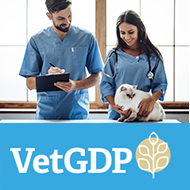RCVS extends VetGDP training deadline

A key feature of the VetGDP is the requirement of a trained VetGDP advisor.
The RCVS has extended the deadline to its Veterinary Graduate Development Programme (VetGDP) by six months, to December 2021, to give practices more time to complete the required online training.
The original deadline was June 2021, after which practices looking to employ this year's cohort of graduates should have obtained VetGDP status. But the RCVS said it recognised the 'ongoing pandemic restrictions' and the 'significant additional pressures on practice teams'.
“While we know that some people will be able to complete the online training required to become a VetGDP Adviser quite quickly if circumstances allow, we also know that some people have additional commitments that mean training may take longer to complete,” commented Dr Linda Prescott-Clements, RCVS Director of Education.
“Therefore, instead of VetGDP Advisers needing to have fully completed the online training before the new graduate joins the workplace, we now require that the training has been started and is being actively engaged with, and will be completed as soon as circumstances allow."
She added: “For 2021, we, therefore, expect that VetGDP Advisers will have completed their training by the end of December 2021. We also expect that graduates will be supported during their first months in practice, while vets are completing the online training.”
A key feature of the VetGDP is the requirement of a trained VetGDP Advisor, who will provide one-to-one support and advice to new graduates to help develop their confidence in their journey to become experienced, independent vets
Under the scheme, practices wishing to employ new graduates must have at least one trained VetGDP advisor to ensure the provision of this support. This will involve a short, free online training course that will contribute to their practice being recognised as an RCVS-approved Graduate Development Practice.
The RCVS will be holding three interactive workshops in February to explain the Programme and the changes that have been introduced. The workshops are open to everyone in the practice team interested in becoming a VetGDP Advisor, taking place on:
- Wednesday 3 February, 12:00 - 1:30 pm
- Thursday 11 February 12:00 - 1.30 pm
- Monday 15 February 7.00 – 8.30 pm



 The veterinary mental health charity Vetlife is inviting the veterinary community to join it for a sponsored cold-water dip.
The veterinary mental health charity Vetlife is inviting the veterinary community to join it for a sponsored cold-water dip.